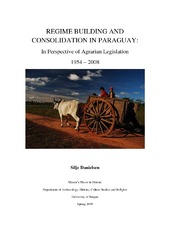| dc.contributor.author | Danielsen, Silje | eng |
| dc.date.accessioned | 2009-07-02T12:26:51Z | |
| dc.date.available | 2009-07-02T12:26:51Z | |
| dc.date.issued | 2009-05-15 | eng |
| dc.date.submitted | 2009-05-15 | eng |
| dc.identifier.uri | https://hdl.handle.net/1956/3335 | |
| dc.description.abstract | This thesis examines the historical development of regime building and consolidation in Paraguay in the period of 1954 - 2008. The period is comprised by two distinct regime-epochs -the dictatorship of Alfredo Stroessner between 1954 and 1989 and the introduction of democratisation following the downfall of Stroessner. Constructing a historical synthesis, the thesis focuses on explaining the underlying and internal factors within the development in question. It analyses the regimes' institutional framework -examining the hierarchical relation between institutions within the framework as a whole, as well as it examines the relations between the regimes and political, economic, and social interest groups as potential actors of institutional change. The theory of Douglass C. North on institutions and institutional change is applied as an analytic tool in understanding the regime building and consolidation on a meta-level. With basis in this institutional analytical framework the thesis examines the development in the regime building and consolidation in perspective of agrarian legislation. Between 1954 and 2008 Paraguay remained a mainly rural society. Agriculture constituted the main engine of national economic growth, at the same time providing a vital source of survival to the mainly rural Paraguayan population. The thesis recognises the regulation of agricultural resources and agricultural activity as a key component in the search for political stability and legitimacy in the two regime-epochs. In the Stroessner period the agrarian legislation is interpreted from its political value as an instrument of control and as an expression of the character of the regime. Under democratisation the thesis examines the agrarian legislation as having a function in, as well as constituting an expression of, the mechanisms at work in the emerging democracy. | en_US |
| dc.description.abstract | Esta tesis examina el desarrollo histórico de la construcción y consolidación del régimen en Paraguay durante el periodo de 1954 - 2008. Este periodo esta comprendido por dos distintivos regímenes-épocas; el periodo dictatorial del General Alfredo Stroessner comprendido desde el año 1954 a 1989 y la introducción de la democratización seguida a la caída del régimen del General Stroessner. Construyendo una síntesis histórica, la tesis se enfoca en explicar y denotar los factores internos de este desarrollo en cuestión. Esta analiza la estructura institucional de estos regímenes-examinando la relación jerárquica entre las instituciones dentro de esta estructura como un todo, a la par que examina las relaciones entre los regímenes y los intereses de grupos políticos, económicos y sociales como actores potenciales de cambios institucionales. La teoría de Douglas C. North sobre instituciones y cambios institucionales es aplicada como una herramienta analítica en el entendimiento de la construcción y consolidación de este tipo de regímenes en un nivel mas elevado. Usando como base este marco institucional analítico, la tesis examina el desarrollo en la construcción de estos régimenes y en la consolidación en perspectiva de una legislación agraria. Entre los años 1954 a 2008, Paraguay se ha mantenido como sociedad principalmente rural. La agricultura constituye la maquinaria principal del crecimiento económico nacional, al mismo tiempo proveyendo de una fuente vital de supervivencia de la población, especialmente la rural. La tesis reconoce la regulación de recursos agrícolas y a esta actividad como un componente principal en la búsqueda de estabilidad política y legitimidad en los dos regímenes-épocas. En el periodo del General Stroessner la legislación agraria esta interpretada desde su valor político como instrumento de control y como una expresión del carácter de su régimen. Bajo bases de democratización la tesis examina la legislación agraria como teniendo una función, a la par de estar constituyendo una expresión, de los mecanismos que trabajan en una democracia emergente. | en_US |
| dc.format.extent | 1881267 bytes | eng |
| dc.format.mimetype | application/pdf | eng |
| dc.language.iso | eng | eng |
| dc.publisher | The University of Bergen | eng |
| dc.subject | Paraguay | eng |
| dc.subject | Politics | eng |
| dc.subject | Regime | eng |
| dc.subject | Agricultural legislation | eng |
| dc.title | Regime Building and Consolidation in Paraguay: In Perspective of Agrarian Legislation 1954- 2008 | eng |
| dc.type | Master thesis | |
| dc.rights.holder | Copyright the author. All rights reserved | |
| dc.rights.holder | The author | eng |
| dc.description.degree | Master i Historie | |
| dc.description.localcode | MAHF-HIS | |
| dc.description.localcode | HIS350 | |
| dc.subject.nus | 713107 | eng |
| dc.subject.nsi | VDP::Humaniora: 000::Historie: 070::Samtidshistorie (etter 1945): 084 | |
| fs.subjectcode | HIS350 | |
